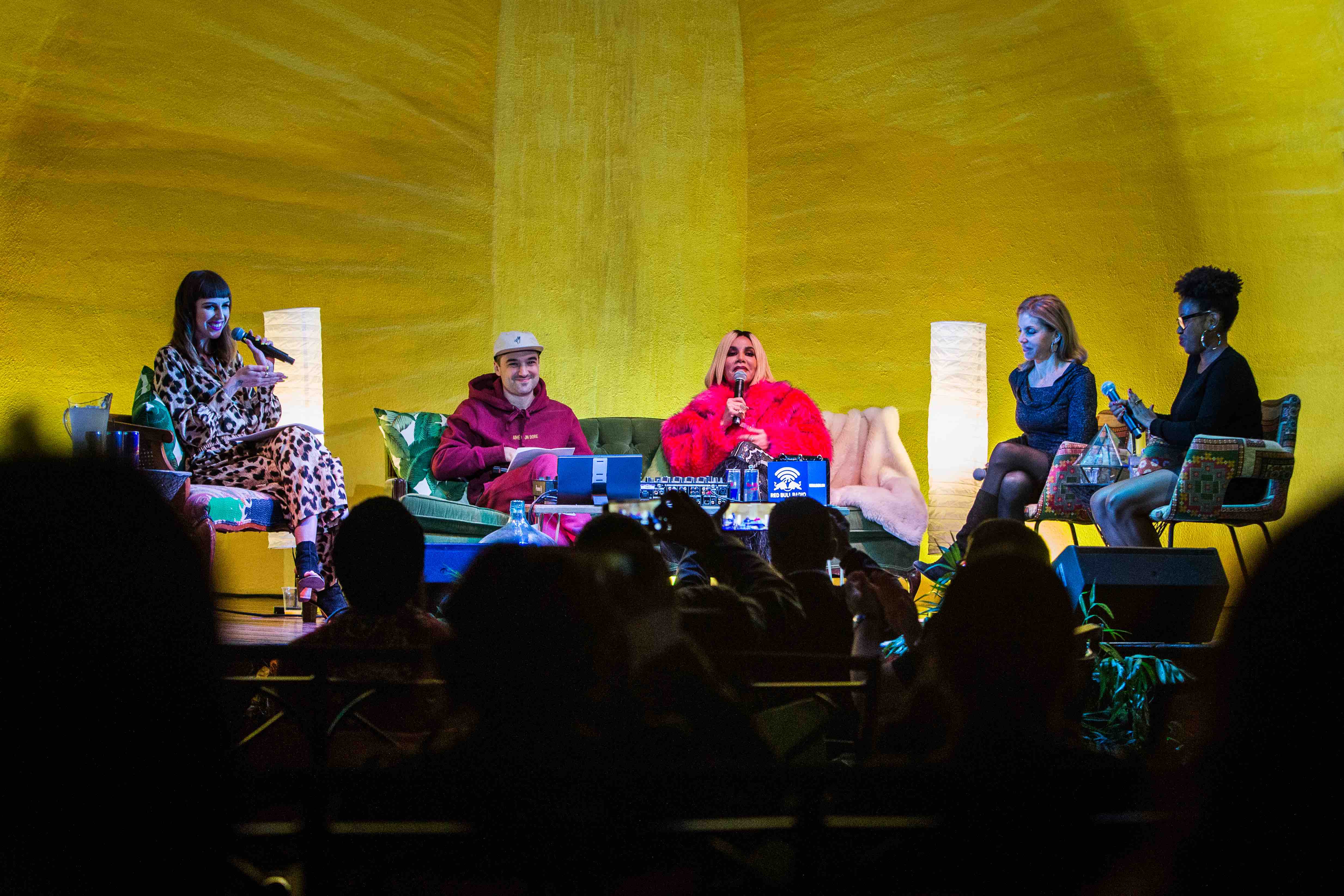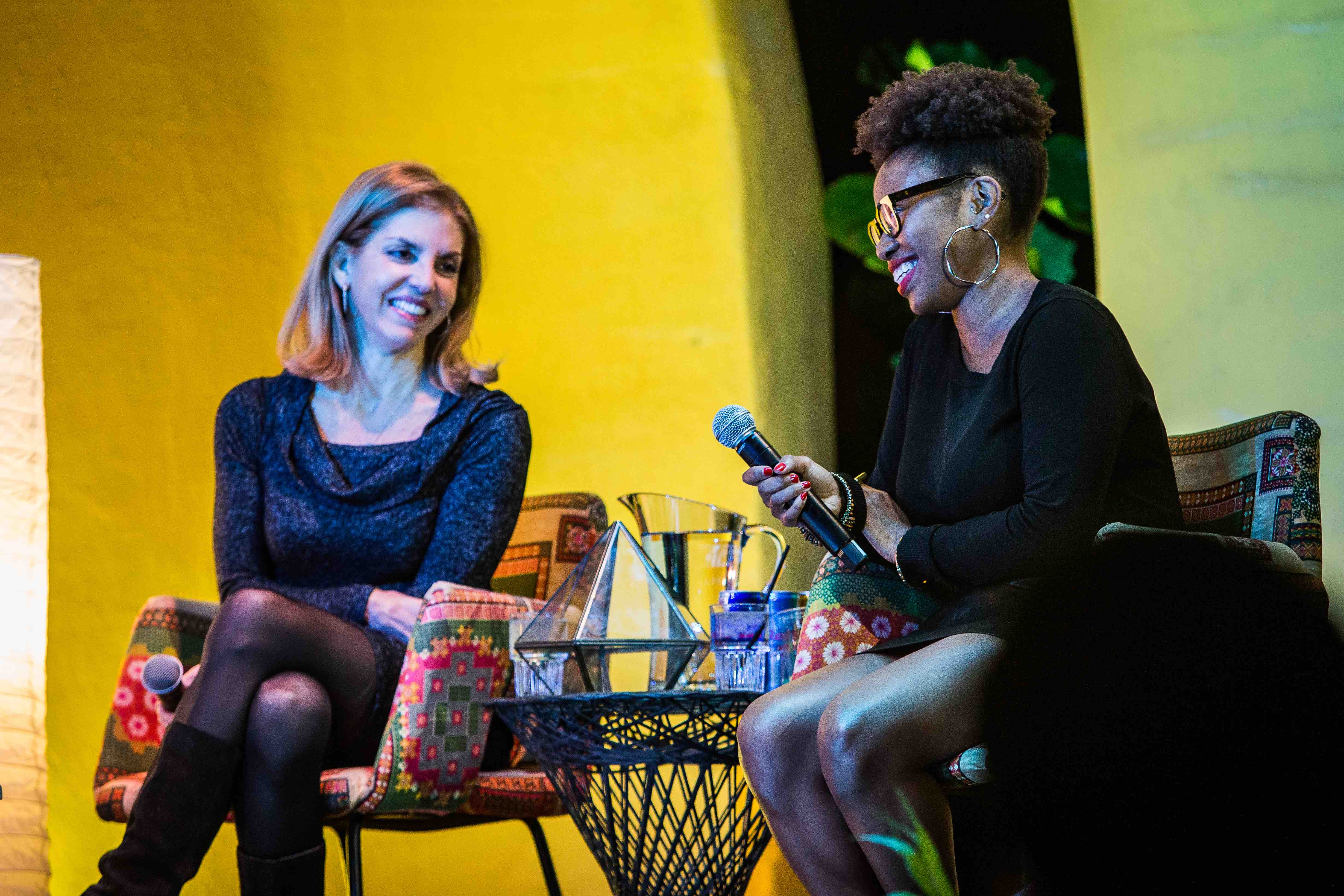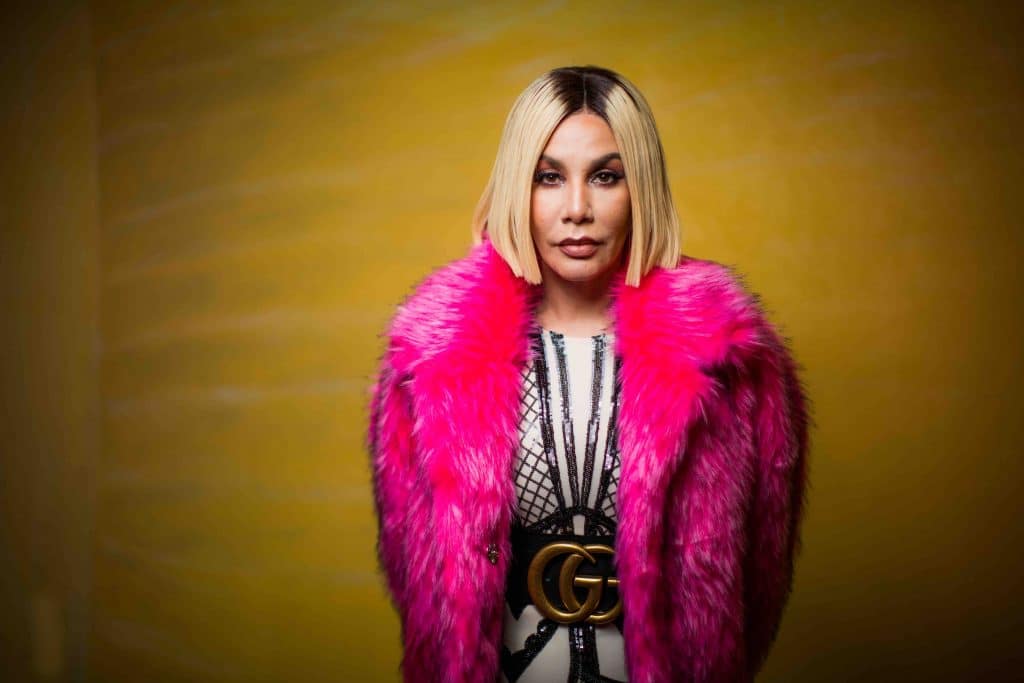Ivy Queen, the trailblazer and undisputed matriarch of reggaeton, joined Uproot Andy and Riobamba on Red Bull Radio’s Bien Buena last night — and she arrived in all her iconic glory. Sitting in a hot pink fur coat, the iconic rapper and lyricist dropped knowledge on pretty much everything, from the early days of reggaeton to women’s empowerment to the trajectory of música urbana today.
She was joined before a live audience by Leila Cobo, Bilboard‘s executive director of Latin content and programming, and Janel Martinez, the editor-in-chief and creator of Ain’t I Latina, while Riobamba and Uproot Andy spun a mix of reggaeton hits from women throughout the decades.
The episode will re-air on November 30 at 4 p.m., and listeners can tune in over at Red Bull Radio. Until then, here are some highlights and things we learned from the conversation.
Despite Early Criticism, Ivy Queen Embraced Her “Macho Voice”
Ivy Queen: I lived in the West area of Puerto Rico — West side, ride or die — and I fell in love with music and I was looking for opinions, second opinions, and other people’s opinions. And that’s when I found out that people were telling me that my voice was very masculine, that I sounded like a man. I was small; I was skinny. But I was like, “You know what, this is what I want to do. This is what my heart is telling me.” So I told my mom. I was raising my brothers — my mom and my dad divorced — so I told my mom, “It’s time for me to do what I gotta do.” Basically, I left with nothing — I didn’t have anything, except notebooks and notebooks of songs, and I got to San Juan and Bayamón, Puerto Rico, where there was an audition and there were no women.
When I walked in, all the men were looking at me like, “Who the fuck is this?” It was hit the mark or hit the mark. There was no way I was going to go back to my town, broke and defeated. So I said, “Let me do this.” I started freestyling basically, and the DJ was looking at me like, “She’s so small. How does her voice come out like that?” What for other people was like a factory error — “she has a macho voice!” — for me was a blessing. Because even though there were men on those tapes, I was standing out because my voice has always been strong.

Ivy Queen Was So Shy, She Auditioned For DJ Negro With Her Back to Him
Ivy Queen: It was like “Who’s next?” And they said, “Oh, the girl who came from Añasco.” And I went in the middle of all the men, and I was shy, believe it or not. So I grabbed the mic and put it against the wall because I didn’t dare look at Negro in the face. I was shy. Yes, I was — past tense, because now you don’t see that. So when he sees that I grab the mic and put it towards the wall and I turned my back on him — everyone looked him in the face — I started singing and I couldn’t see his reaction. And when I turned around, I saw him looking at me like nothing, really serious. And I said, “That’s a song I recorded for DJ Playero and that song is promised and it’s going to be on Playero 37.” And he said, “Oh, so you think Playero is harder than The Noise?” So I said, “Well.” And he said, “You’ll see who’s going to reign on that tape.”
“I was standing out because my voice has always been strong.”
I think he was trying to slap Playero all over with that shit. So that’s when I sang “Muchos Quieren Tumbarme.”
Panama Needs — and Should Keep Getting — Its Recognition in Reggaeton
Janel Martinez: When people have access and conversations around Latinidad, Central America oftentimes doesn’t get the focus. I think that’s part of it. I also think, to be quite transparent, colorism is a big part of it as well. A lot of these artists from Panama, if we look into the history, over a hundred thousand West Indians came to build the canal. So when you have that presence from Jamaica to a Central American country, naturally fusion happens, so with that being said, we see the folks coming out of there and making the music.
Ivy Queen: I was touring with The Noise and we ended up in Panama, and we went to a party and when we came in, everyone was looking at us because the Boricuas had come to Panama. I’ve always loved their music and I knew their culture. So when I got there, I recognized the faces of the raperos panameños, but everyone is looking at us and what we didn’t know is that they had a match [set up] — a battle of Panama versus Puerto Rico. So, I walked toward the Panamanians to say what’s up and to say hi, and my people is looking at me like, “Who is this traitor?” But it was all about love, and I said hi and I gave them their respect. And I said, ‘We’re not here to battle; we just found out they sold the tickets as a battle between los Boricuas y los panameños.” So we went on and we did what we had to do and at the end everyone shook hands. But the reality is we have to give props to Panamanians for their music and their contributions. The regrettable thing is that they couldn’t get out as much. We Boricuas could fly to any place, but for them it was harder and everything stayed underground. That was hard.

“Yo Quiero Bailar” Came Out of Ivy Queen’s Real Experiences on The Dance Floor — and Resonates Today
Ivy Queen: I was a tomboy, so I used to go to the clubs and see the pretty girls upset, because the guy used to grab them in the club and bother them. So being the tomboy, I wasn’t getting that — not complaining — but then that’s what fueled me to write “Yo Quiero Bailar.” So I said, “Okay, we’re going to write this,” and that’s how “Yo Quiero Bailar” was born. The lyrics say everything: “Yo quiero bailar, pero eso no quiere decir que pa’ la cama voy.”
“We’re sexual beings and it doesn’t need to be policed.”
I was like, “This is it.” Like I said, I’ve always been inspired by reality. I can’t write about a gun if I’ve carried a gun in my hand, and I can’t talk about wealth if I never had it, hunger if I never experienced it. So “Yo Quiero Bailar” was looking at what I saw happening at the club.
To this day, it’s amazing, because we’re in the era of Instagram, Facebook, and all social media. To this day, I still receive messages from women singing the song or doing Zumba with the song or singing it to their husbands. It’s about uniting us. That is where I find satisfaction making music…having years pass by and [still] having people say “Whoa.”
Cobo: This song is perfect. I think it’s a song that works today. 20 years later, it still works. I think anyone can relate to the song.
Martinez: The key message is women – we’re sexual beings and it doesn’t need to be policed. If we say it’s okay, it’s okay. If we want to be on the dance floor and we want to throw it back because perreo is all about that, that’s fine. We can do that. But it starts with us defending that for ourselves instead of the man, and that’s the key messaging that I hear in it.
The Panel Weighed in on How the Industry Has Changed for Women — and How It Still Faces Issues of Colorism
Ivy Queen: (responding to Becky G and Natti Natasha’s “Sin Pijama.”) I think they look fabulous. They are gorgeous girls [pause]. I have nothing against them; I think I work my ass off representing the ladies in an elegant and classy way. I think they’re doing their work, they’re portraying themselves as they want, and you have to respetar la variedad.
Janel Martinez: Some feedback that I’ve heard especially from the video is, here are two Latinas that collaborated, which is a power play and also that [they] are showing, “Okay, here we are.” It’s on their own terms to a certain degree, but I do I agree it’s different. And I also agree that industry wise, it’s palatable. They have the privilege, if they want, and I’m not knocking the grind that they have done, but I also think, again, when we go back to access, who has access to switch like that? There are some people that can’t even get their first shot. And a lot of times it does boil down to access and a lot of times access boils down to appearance and a lot of times black…There are some artists out here that may not necessarily be in the same lane – we’re not going to call them reggaetoneras or anything – but Melii from Uptown Harlem, she’s hard. That girl, lyrics, boom, on point, and she’ll have a track in English, but she also switches it up and she’ll also do something in Spanish, so I don’t know, I think why haven’t we heard more about her? It’s not an attack on the person, I also think it’s very important to note this. It’s an attack on the structure, the music industry – how it thrives, how it moves, it’s about look, it’s about sound, it’s about your appearance, it’s about who you have access to in a time and place, and a lot of times when we think about who is given that first shot, it’s someone that looks like a Becky G , a [Natti Natasha], whoever.
The comments from panelists have been condensed and edited for length and clarity.







